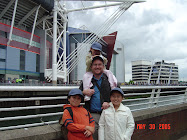Today is history day in this house because we visited Clarksville which opens only one day a year. Clarksville is an old settlement in on Lincoln Highway (now Hwy 50) which happens to be on the now El Dorado Hills. The school building still remains along with some of the houses including the home of Samuel Kyburz (who, according to some controversial sources, first discovered gold, not James Marshall, in Coloma Valley). When the gold rush subsided and people realized that there was not enough gold for everyone to live on, some began to venture in agriculture. Although there is not a lot visible signs of agriculture that remain in the area, remnants of an agrarian past can be found if you look harder. For example, my husband and I, on our hikes on the undeveloped hills around, found some old troughs which indicate that the area was once used as a pasture.
 |
| Miriam, Nick and Griffin had a display at the old school house of Clarksville. |
Along Hwy 50 just east of El Dorado Hills Town Center, Clarksville looks nothing more like an old barn but if you get close and learn about the place, it is quite interesting. One thing I learned today is that the first concrete road in California was built in Clarksville. In those days cement new concept and so Portland Cement build a section of the Lincoln Hwy to demonstrate the effectiveness of cement as a construction material for roads. To this day, part of that historic road remains.
 |
| The most prominent remaining structure on Clarkville used to be a school house. |
 |
| In those days, they would be traveling on dirt road. :) |
 |
| Pony Express |
 |
| Maybe these horses are of better breed than the what the folks had during the Gold Rush. |
 |
| This would have been a real estate to write home about. |
 |
| Explosive were probably a legal but not cheap form of entertainment :) |
 |
| Even this UC Davis Mom was there (notice the hat) :) |
 |
| And so with this UC Irvine Dad was there. |
It seems to me that our community is raising awareness to the fact that our place was once upon a time a lively community in a time gone by. There was a period of when not much was happening but it is again in an era of change and development. The future generation will see footprints of what is being done now by us who are here and now. Some of the things they'll will see will be appreciated while some will leave their minds questioning.
History links the present back to the past - maybe for a better tomorrow.


































No comments:
Post a Comment
Leave a Response